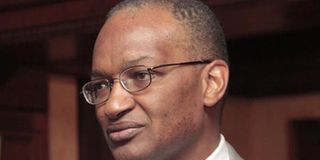Others should copy Njoroge’s gesture of turning down juicy CBK perks

Dr Patrick Ngugi Njoroge at the Serena Hotel in Nairobi on June 30, 2015. PHOTO | DIANA NGILA |
What you need to know:
- Dr Njoroge’s gesture may be but “a small detour” to righteousness in service.
- But why mayn’t it personify the concept of leading by example?
By rejecting certain perquisites, Dr Patrick Ngugi Njoroge’s is a pleasant surprise. For he thus seems to distance himself decidedly from one characteristic of the Third World’s consumer habits – a class notorious for maggot appetites, splurges of consumption and a liberal dipping of long fingers into the public’s coffers.
According to a Daily Nation report, Dr Njoroge will not live in the offered “… expansive home …” in the capital’s elitist Muthaiga. He will, instead, occupy a “communal accommodation” among fellow members of the Catholic Church’s Opus Dei at relatively lower-rung Loresho.
Nay, more. As the Nation put it, Dr Njoroge is also “… turning out to be a man of exemplary modesty [and] has turned down an office-issued high-end smart phone, a bevy of security guards and three cars.” That is why Opus Dei’s link to the Vatican in ways that have raised eyebrows worldwide seems beside the point here.
It should take nothing away from Dr Njoroge’s reported personal qualities – the humility, impersonality, social dedication, sense of proportion and a more than ordinary awareness of how a poor Third World state like Kenya should handle, conserve and deploy its meagre fiscal resources to raise its people’s living conditions as rapidly as can be.
If his mind is deeply socially trained, this may mingle powerfully with the financial whiz kid that he is to radically streamline our higgledy-piggledy manner hitherto of collecting, conserving, dishing out and spending money and other resources in the government, in the parastatal empire and in every other area of service, governance and defence.
Newspaper headlines in recent months indicate that official Kenya has sunk to a frightening depth of lassitude and anarchy with regard to resource management. A lackadaisical attitude to work appears to have invaded every public accounting unit, and personal and group indiscipline looks to have overwhelmed every nook and cranny of our resource governance and public spending.
No, I do not suggest that Dr Njoroge’s gesture is what Shakespeare called “the be-all and the end-all here”. It may be but “a small detour” to righteousness in service. But why mayn’t it personify the concept of leading by example? Why might it not, after a while, humble all subordinates in the bank and elsewhere in the public service into “copying this man”? For, to be sure, in conserving resources, a small start must be made somewhere. The attitude prevailing in all newly self-governing countries is for members of the ruling class – both as individuals and collectively – to carry themselves with the same chest-thumping heroics as Kenneth Grahame’s Mister Toad.
From his imposing and extraordinarily appointed Toad-hall in the city’s peripheries, Mister Toad took sadistic pleasure in terrorising the “Riversiders and Wayfarers All” by perching himself upon the driver’s seat of a newly invented contraption called The Car and zooming at a speed that would have embarrassed Neil Armstrong (in his Apollo contraption) towards the moon in 1969.
Mister Toad would “over-speed” (to use a high-tech word recently coined by Kenya’s very creative non-governmental organisations (NGOs) at a rate that would overwhelm the drivers of Nairobi’s matatus with a sense of self-inadequacy. No, it is not an endemically Kenyan thing. You have seen nothing if you have not visited Cairo
It is not even African. No, matatuism (all complete with a deafening environmental noise in a country which headquarters the United Nations Environment Programme) is to be experienced among all the newly rich classes in all continents. That is how Dr Njoroge may rescue Kenya. This matatu mentality in everything that Kenyans do appears to be Dr Njoroge’s prime target.
Think of how much money Kenya would conserve for development if officials evinced considerably greater wisdom and enlightenment in resource investment, resource management and resource use. Overnight, we might make everything available for catalysing development just by preferring cost-effective houses, cars and other consumer goods.





